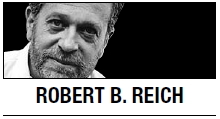A week before his inauguration, President Obama said he wouldn’t negotiate with Republicans over raising the federal debt limit.
At an unexpected news conference Jan. 14, the president asserted that he won’t trade cuts in government spending in exchange for raising the borrowing limit.
“If the goal is to make sure that we are being responsible about our debt and our deficit, if that’s the conversation we’re having, I’m happy to have that conversation,” Obama said. “What I will not do is to have that negotiation with a gun at the head of the American people.”

Well and good. But what, exactly, is the president’s strategy for when the debt ceiling has to be raised, if Republicans haven’t relented?
He’s ruled out an end-run around the GOP. The White House said over the weekend that the president won’t rely on the 14th Amendment, which arguably gives him authority to raise the debt ceiling on his own.
And his Treasury Department has nixed the idea of issuing a $1 trillion platinum coin that could be deposited with the Fed, instantly creating more money to pay the nation’s bills.
In a pinch, the Treasury could issue IOUs to the nation’s creditors ― guarantees they’ll be paid eventually. But there’s no indication that is Obama’s game plan, either.
So it must be that Obama is counting on public pressure ― especially from big business and the GOP’s patrons on Wall Street ― to force Republicans into submission. That was probably the reason for the unexpected news conference, which was held at least a month before the nation is likely to have difficulty paying its bills.
The timing may be right for such a strategy. The president is riding a wave of post-election popularity. A recent Gallup poll showed him with a 56 percent job approval rating, his highest rating in more than three years.
By contrast, approval ratings for Republicans are in the pits. John Boehner has a 21 percent approval rating, according to Public Policy Polling, and 60 percent disapproval. Senate Minority Leader Mitch McConnell has an approval rating of 24 percent. Not even GOP voters seem to like Republican lawmakers in Washington, with 25 percent approving and 61 percent disapproving, according to PPP.
And Americans remember the summer of 2011, when the GOP held hostage the debt ceiling, bringing the nation close to a default and resulting in a credit-rating downgrade and financial turmoil that slowed the recovery. The haggling hurt the GOP more than it did Democrats or the president.
But Obama’s strategy depends on there being enough sane voices left in the GOP to influence others. That’s far from clear.
Just moments after Obama’s press conference last week, McConnell called on the president and his allies “to get serious about spending,” adding that “the debt-limit debate is the perfect time for it.”
Boehner issued a statement following Obama’s press conference, saying, “The American people do not support raising the debt ceiling without reducing government spending at the same time.”
The 2012 election has shaken the GOP, as have the post-fiscal cliff polls. Yet, as I’ve noted before, the Republican Party may not care what a majority of Americans thinks. The survival of most Republican members of Congress depends on primary victories, not general elections ― and their likely primary competitors are farther to the right than they are.
By Robert Reich
Robert Reich, former U.S. secretary of labor, is professor of public policy at the University of California at Berkeley and the author of “Aftershock: The Next Economy and America’s Future.” He blogs at www.robertreich.org. ― Ed.
(Tribune Media Services)








